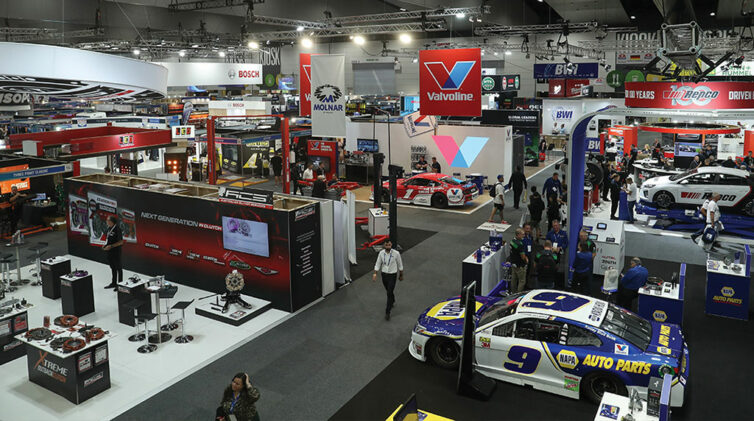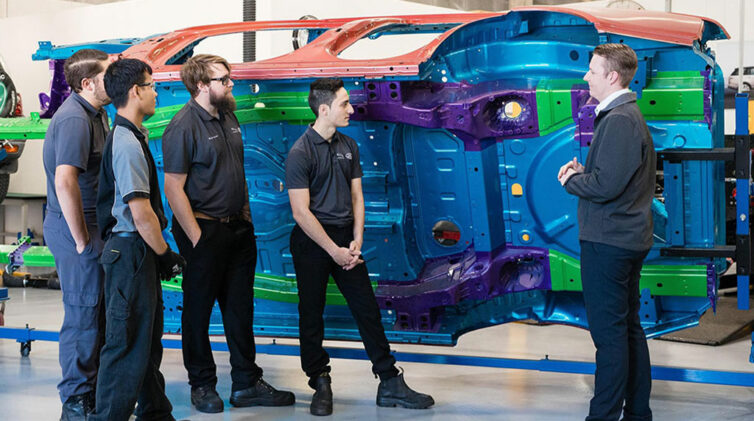While broader tax and economic policies were another matter, a survey by the Australian Automotive Dealer Association (AADA) of both major parties in response to its ‘Driving Our Future’ election campaign showed both parties shared common ground.
The AADA asked both parties to address its four policy priorities including an automotive code of conduct, affordable new vehicles, ruling out used-car imports, and a consumer-focused emissions policy.
AADA CEO David Blackhall said the association ranked each response on a scorecard to illustrate each party’s commitment.
“On this occasion the two parties could not be separated,” Mr Blackhall said.
“We are delighted that both sides of politics have provided an election commitment to introducing a code of conduct for the retail automotive industry. This is the number-one priority for new-car dealers and we look forward to working with the future government and opposition to make this commitment a reality,” he said.
“Unfortunately, there are no specific policies to remove legacy taxes on new cars, which disadvantages consumers, but we note that Labor’s Australian Investment Guarantee has the potential to make certain vehicles more affordable for businesses.
“Both parties have ruled out expanding the regime for used-car imports. However, we remain concerned that there may be unintended consequences arising from regulations currently before the parliament. We will work with whoever forms government to address these concerns.
“On the question of vehicle emissions, there is a distinct lack of detail from both sides, but we are pleased that each party has clearly stated they will work with industry in formulating vehicle emissions policies.
“After the election, the AADA will work closely with whoever wins government to advance the interests of the automotive industry,” he said.

Scott Morrison
What the Morrison government said to the AADA:
- A fairer automotive industry: What are the party’s plans for an automotive code of conduct regulating the relationship between car dealers and offshore manufacturers?
The Morrison government is committed to supporting a competitive new-car retailing sector that provides car dealers a fair go and ensures that consumers have access to a wide range of vehicles that meet their needs.
If re-elected, a Morrison government would implement regulatory reform to support appropriate commercial dealing and competition in the new-car retail supply chain.
We have already undertaken significant consultation with the automotive sector, including with the AADA to investigate potential reforms to level the playing field in relationships between dealers and manufacturers.
- Affordable new cars: Does the party have any plans to improve the affordability of new cars, such as through the removal of taxes, such as import tariffs and luxury car tax?
The dollar threshold for when the luxury car tax first applies is increased each year to keep in line with inflation. The Morrison government is lowering taxes, and has prioritised personal income tax relief and small business tax relief so Australian taxpayers and small business can keep more of their hard-earned money.
- Rule out used-car imports: Will the party commit to ruling out an expansion of used-car imports to ensure Australia has a safe vehicle fleet?
The Morrison government has introduced a new package of road standards legislation and new Road Vehicle Standards Rules were made by the minister in February 2019. The new arrangements will commence on December 10, 2019.
The Morrison government is pleased to have been able to make these reforms so that there is stronger and more modern legislation, expected to save businesses more than $20 million a year in regulatory compliance costs.
The question of loosening import laws for second-hand vehicles – especially second-hand low-emission and electric cars – this was thoroughly debated in the passage of the legislation. The government has no intention of revisiting this question, given that safety of the vehicle will be uncertain and to ensure the new legislation has time to be bedded-down.
- Consumer-focused emissions policy: What are the party’s plans to lower emissions in passenger vehicles?
The Morrison government’s goal is to encourage cleaner, more affordable cars that use less fuel, as this means cheaper bills for families and is better for our health and the environment.
We won’t be doing this though implementing draconian emissions standards that drive up the cost of cars and utes as proposed by Labor. Instead, the Ministerial Forum on Vehicle Emissions will continue to work with industry and other stakeholders on practical solutions to vehicle emissions.
The Morrison government wants a sensible framework that places savings for motorists and health benefits for the community front and centre, while ensuring that the vehicles that Australians value remain in the market.
The Morrison government also knows that cars are becoming more fuel efficient and that consumers are looking for vehicles that cost less to run. We have agreed changes to fuel quality standards that will not only mean cleaner air, especially in our cities, but also support manufacturers to provide the latest technologies from around the world.
We are also supporting consumers (to) make informed decisions on fuel-efficient vehicles through fuel consumption labels for new light vehicles and the Green Vehicle Guide (GVG) website. Both the label and the GVG help consumers choose vehicles that are more efficient.

Bill Shorten
Response from the Labor Party to the AADA:
- A fairer automotive industry: What are the party’s plans for an automotive code of conduct regulating the relationship between car dealers and offshore manufacturers?
Labor’s shadow assistant treasurer and shadow minister for competition and productivity Andrew Leigh, accompanied by the member for Oxley, Milton Dick, were pleased to announce Labor’s commitment to an automotive code of conduct last year.
We intend to implement an industry-specific code through regulations under the Competition and Consumer Act to deliver clear rules for manufacturers and dealerships.
The current power imbalance means manufacturers can impose contract terms and set dealership expectations which are to their own advantage, making it difficult for local dealers to properly look after their customers. In particular, the pressure this creates on dealers impacts on small and family businesses and can affect how cars are serviced and repaired, and how warranty claims are handled.
Contract terms are often grossly unfair, including unilateral variations of terms by the manufacturers, despite the good faith of the dealers and their very large upfront capital expenditures. The independent code will create a set of rules that both the manufacturers and dealers must observe when establishing expectations around dealer conduct.
Should a Shorten Labor government get elected, we look forward to the prospect of implementing this code in consultation with the AADA and its members.
- Affordable new cars: Does the party have any plans to improve the affordability of new cars, such as through the removal of taxes, such as import tariffs and luxury car tax?
Yes. Labor’s Australian Investment Guarantee (AIG) is a tax incentive, with specifications that apply to certain vehicle purchases.
Our ongoing AIG will allow all businesses to immediately deduct 20 per cent of investment in eligible depreciable assets, except structures such as buildings, with the remaining investment in eligible depreciable assets not immediately deducted would continue to be deductible over the effective life of each asset.
The proposal would only apply to assets above $20,000 in value. The eligible assets would include tangible machinery, plant and equipment; as well as depreciating intangible assets for both upgrades and new purchases.
Although it generally does not apply to passenger motor vehicles, it would apply to vehicles under the following conditions: battery-electric vehicles, and hydrogen fuel-cell vehicles; and non-passenger motor vehicles such as lorries, vans, utes and trucks that are used to support trade businesses.
Labor understands that a smooth transition to lower-emission vehicles requires incentives through the tax system, and the application of AIG to electric vehicles is a highly targeted approach. To complement this, Labor will invest in charging stations around Australia to support a growing electric vehicle fleet.
Labor also supports the complementary instant asset write-off for small businesses, for assets up to $30,000.
- Rule out used-car imports: Will the party commit to ruling out an expansion of used-car imports to ensure Australia has a safe vehicle fleet?
Labor has no plans to deregulate or expand upon the current framework for the importation of used vehicles.
Labor notes the Liberal government explored deregulating ‘grey car’ importation rules following the Harper Review into Competition Policy, but ultimately abandoned its plans in 2017.
Motor vehicle standards are carefully regulated for reason – we must not sacrifice safety and the other protections consumers rightly expect. Driving in Australia is not the same as driving in UK and Japan. We have very different climatic conditions and design standards. Labor has not considered the matter since considering the government proposal in 2017.
- Consumer-focused emissions policy: What are the party’s plans to lower emissions in passenger vehicles?
A Shorten Labor government will work with Australia’s transport sector to cut vehicle emissions, boost adoption of electric vehicles and help Australians save on their petrol bills. Cleaner cars and transport aren’t just good for the environment – they are cheaper to run.
But Australia lags behind our competitor countries, whether it’s in electric vehicle take-up, or vehicle fuel efficiency. We have 10 times lower electric vehicle take-up than the global average, and we have no vehicle CO2 or fuel efficiency standards. We’re at risk of being left behind.
That is why Labor will set a national electric vehicle target of 50 per cent new-car sales by 2030. The global transition to electric vehicles is well underway, but the Liberals’ failure to deliver credible climate change and electric vehicle policies means Australia is now last among western counties for electric vehicle uptake.
Labor will also set a government electric vehicle target of 50 per cent of new purchases and leases of passenger vehicles by 2025. This government fleet target will send a strong signal to the global industry that we expect cost competitive vehicles to be available for the Australian market.
As noted earlier, Labor will allow businesses an upfront tax deduction to purchase electric vehicles for business purposes, as part of Labor’s announced Australian Investment Guarantee. We will allow business to immediately deduct 20 per cent depreciation for electric vehicles valued at more than $20,000 as part of private fleets.
Labor will establish an electric vehicle COAG agenda to improve coordination of electric vehicle take-up and related infrastructure planning. Labor will also require all federally funded road upgrades to incorporate electric vehicle charging infrastructure, work with states to ensure new and refurbished commercial and residential developments include electric vehicle charging capacity, promote national standards for electric vehicle charging infrastructure, and ensure investment in public charging stations meet these standards.
As part of our focus on cleaner and cheaper transportation, Labor will also work with industry to introduce vehicle emissions standards. Australia is one of the only countries in the OECD that does not have vehicle CO2 emissions standards.
According to the government, this means Australians will be paying as much as $500 each year more in petrol than they should be, as well as seeing more pollution on our roads. Labor will introduce vehicle CO2 emissions standards to reduce pollution and make the cost of driving a car cheaper for consumers.
Labor will aim to deliver standards in line with 105g CO2/km for light vehicles, consistent with the US standards and Climate Change Authority advice. We will consult on the phase-in timeline and coverage of these standards with industry, including the AADA, to maximise savings for motorists.
Standards will be applied on an average emission basis and be subject to real-world testing, rather than imposing blanket mandatory standards on manufacturers or specific car models. Labor will consult with industry, including the AADA, on implementation details.
By John Mellor













 Read More: Related articles
Read More: Related articles

